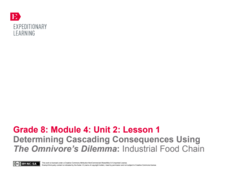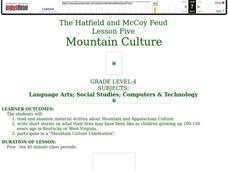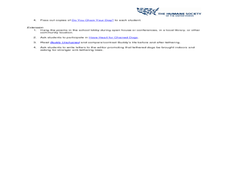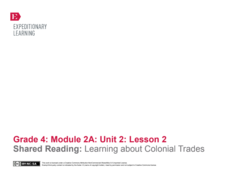EngageNY
Finishing Who? Where? and Why? Research
Who? Where? Why? Scholars answer these questions to help identify the gist of Inside Out & Back Again. First, they add text evidence to their research folders. They then begin looking at a performance task in which they write their...
EngageNY
End of Unit 2 Assessment, Part 2: Revise Essay Drafts
Time to revise! Scholars revise their argument essays based on Shakespeare's A Midsummer Night's Dream using feedback from their teacher and peers. They begin their revisions after reviewing a mini-instructional activity on proper...
EngageNY
Determining Cascading Consequences Using The Omnivore’s Dilemma: Industrial Food Chain
Which of Michael Pollan's four food chains from his book The Omnivore's Dilemma would best feed everyone in the United States? Using a thought-provoking resource, scholars learn how to create a Cascading Consequences chart to answer the...
EngageNY
Using Search Terms for Further Research: Industrial Organic Food Chain
Class members conduct independent research to continue examining the consequences of the industrial organic food chain from Michael Pollan's The Omnivore's Dilemma. Pupils learn about source credibility and effective search terms, then...
EngageNY
Practicing Structures for Reading: Gathering and Using Evidence to Analyze Salva’s and Nya’s Points of View (Chapter 4)
Class members discuss the gist of chapter four of A Long Walk to Water by Linda Sue Park with a partner and share their responses with the class. Next, they complete graphic organizers to answer text-dependent questions based on a close...
EngageNY
Mid-Unit Assessment: Gathering and Using Evidence to Analyze Points of View in A Long Walk to Water (Chapter 5)
Class members discuss how culture, place, and time influence a character's identity in A Long Walk to Water by Linda Sue Park. Then, as part of a mid-unit assessment, they complete a Gathering Evidence graphic organizer to answer the...
EngageNY
Inferring about Character: Analyzing and Discussing Points of View (Chapter 2)
Welcome to the World Café! Readers discuss A Long Walk to Water by Linda Sue Park. They circulate throughout the classroom, stopping at different tables to answer a discussion prompt with their classmates and record their ideas on a chart.
EngageNY
Building Background Knowledge: The Dinka and Nuer Tribes Until the Mid-1980s (“Sudanese Tribes Confront Modern War” Excerpt 1) (Version 1)
Readers consider comparisons between the Dinka and Nuer tribes in South Sudan, making connections between an informational article about Sudanese tribes and the novel A Long Walk to Water by Linda Sue Park. They annotate the text to help...
EngageNY
Building Background Knowledge: The Dinka and Nuer Tribes Until the Mid-1980s (“Sudanese Tribes Confront Modern War” Excerpt 2)
Scholars continue making connections between the article "Sudanese Tribes Confront Modern War" and A Long Walk to Water by Linda Sue Park. They talk with partners to discuss how the article helps them understand a character's point of...
Curated OER
Fact vs. Opinion (Part II)
How can you tell the difference between fact and opinion? Using newspapers, learners determine which articles contain statements of fact, and which articles reflect the writer's opinion. The lesson plan includes a discussion format and a...
Curated OER
You Can Count on Spelling
Here is a cross-curricular activity that is suitable for virtually any grade level! Learners calculate the mathematical value of their spelling words using the letter tiles from a Scrabble game and identify the spelling word with the...
Curated OER
Haven't I Seen You Somewhere Before?
High schoolers discover the true meaning of karma and the related concept of samsara by reading the Jataka Tales. Learners work in groups to become familiar with one form of Buddhist storytelling and examine how Jataka Tales are used as...
Curated OER
"So, What Do You Think?"
Take a stand! Even the most reluctant speakers find their voices if the topics are engaging. Use pictures, photos, or word prompts (I think pizza is the best lunch on the school menu. What do you think?) to stir responses. Encourage...
Curated OER
Kindergarten/First Grade Phonics
Get involved with phonics by recognizing one particular letter. Learners name a letter, know it by sound, decode basic CVC words and use the letter in writing. A variety of options are given to the your learners: making a letter collage,...
Curated OER
Star Reading
Learners of all ages discover the importance of reading fluently by viewing celebrities reading children books and telling about their personal paths to fluency. They participate in a fluency reading routine that connects them with a...
Curated OER
The Hatfield and McCoy Feud
Learners explore West Virginia history with regard to Mountain and Appalachian Culture. They compare and contrast life now with life 100-150 years ago. They write and illustrate a short story about the life of children 100-150 years ago....
Curated OER
Showing not telling writing
How do good writers exhibit emotion in their work without using an emotion word (angry, sad, happy, etc.)? This plan offers learners model texts that describe an emotion without using an emotion word. A well-formatted writing activity is...
Curated OER
Poetic Justice: Understanding the Life of a Tethered Dog
The Humane Society provides a activity in which class members explore the issue of tethering dogs. Through the resources used -- a comic, a poem, and narrative and expository writings -- class members realize that messages can be...
Curated OER
Reading For Information
To help learners better comprehend informational texts, they work through a series of activities. They discuss strategies, make predictions, skim passages, focus on key words, and practice taking notes. This lesson focuses on what to do...
Hawaiʻi State Department of Education
Characters from a Box
Character analysis is a skill we use when we read literary works or want to write a good story. Learners will use drama to practice character analysis while focusing on the details that make characters act the way they do. They'll each...
Curated OER
Lesson: Urs Fischer: Reviving the Past Art Movements
Seven major abstract art movements are analyzed by learners in groups. Each group analyzes various works by determining which work belongs to which movement. They then read Flatland, engage in an art and literary analysis discussion,...
Curated OER
"Lawd! Lawd! Lawd!"
From British accents to Texan drawls, a character's dialect can be an important part of the reading experience. A Six-Trait writing activity guides learners through the analysis of a character's dialect (Daniel Keyes's Flowers for...
Read Write Think
Poetry Portfolios: Using Poetry to Teach Reading
Over the course of five periods, scholars create a poetry portfolio. They begin with a reading of the poem, Firefly. With a focus on vocabulary, learners reread the poem then look for sight words and other skills.
EngageNY
Shared Reading: Learning About Colonial Trades
Trading in Colonial America is the focus of a lesson plan that boosts reading skills. As a class, scholars examine the informational text for crucial details, use their newfound knowledge to share information with their peers, and write...

























